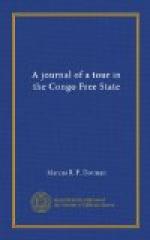In the first place it must be remembered that the Berlin Act applies to all the Powers possessing territory in the Congo basin and not to the Free State particularly, and secondly, that it was agreed upon by the Powers to prohibit monopolies and privileges in commercial matters and to suppress slavery, but not to interfere with the Government of the States or Colonies which were then or might be established and which might or might not sign the treaty. All the Powers indeed which signed the Act of Berlin of 1885 did so voluntarily and among them the Congo Free State which had already been recognised by the whole of Europe as an independent State. The signatory Powers to that Act did not create, define the boundaries, or in any way particularly specify the Congo Free State which is bound by it, therefore, to the same extent only as is England, France, Germany, or other signatory Powers. All these Powers at various times have declared that vacant land is Crown property. A German Imperial Order of November 26th 1895 says that the proprietorship of all vacant land in German East Africa belongs to the Empire. An Order issued by the Commissioner of the French Congo of September 26th 1891 runs “Uncultivated soil and vacant land which nobody legally claims shall be considered as belonging to the State and shall form part of the colonial domain[4].” In the British Empire, the right of the Government to declare vacant lands in the colonies Crown property has been frequently exercised[5]. In annexing all the vacant lands, the Congo Free State therefore, has only followed the usual custom practised by all countries, so that it is obvious these lands are absolutely the property of the State, which, therefore, has a perfect right either to sell or lease them to Companies, Missionaries or Traders, or to collect the produce from them itself.
Indeed it was never intended that the whole Congo Basin should be pegged out into claims by a host of adventurers without any system, law or order, for such a proceeding would have speedily led to complete anarchy. Since then the vacant lands belong to the State, it is obvious that traders can only acquire landed property either from the State, from other traders or persons possessing land. Again it is obvious that a trader only has the right of purchasing the produce of the land from the owner and although he may buy for example, rubber, which a native Chief has grown on his own plantation, no Chief may go into the forest which is State territory, collect the rubber from it and sell it, for such would be simple robbery.
Now the State imposes regulations upon the concessionary Companies and traders, which it also observes carefully itself on its own land in order that the rubber plants shall not be killed and furthermore it stipulates that all who take rubber juice, shall plant young rubber trees and vines to replace those which die in process of time. The supply of rubber is thus assured in the future. In spite however of the most stringent rules the officials of the private companies undoubtedly ill-treat the natives sometimes.




